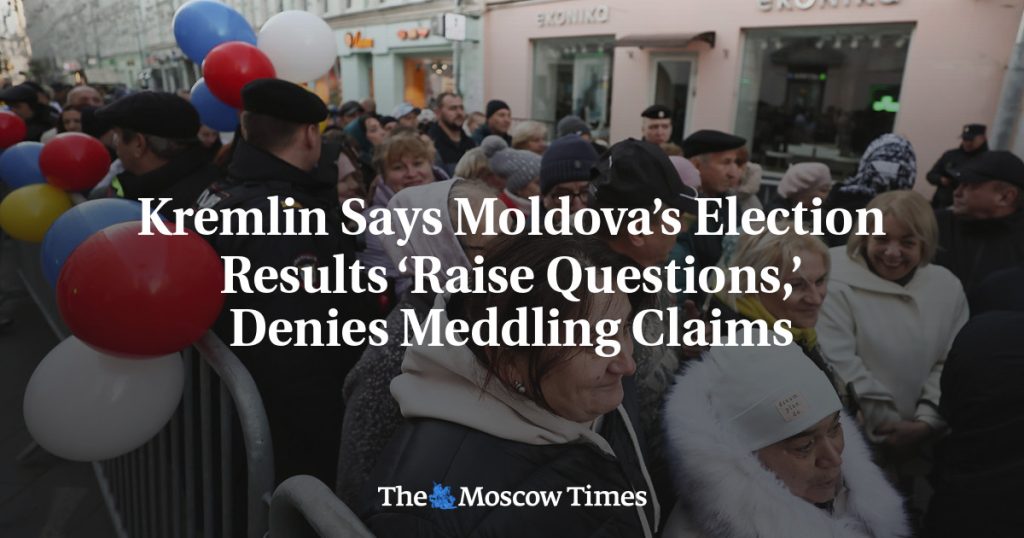Authorities in Moscow are questioning the narrow margin in Moldova’s constitutional referendum on EU membership and rejecting accusations of Russian interference in the presidential election. After nearly 99% of the votes were counted, the “Yes” vote inched into the lead with 50.31% of the total ballots cast. In the presidential race, none of the 11 candidates received more than 50% of the votes, leading to a runoff between President Maia Sandu and Russia-friendly former prosecutor Alexandr Stoianoglo on Nov. 3.
Kremlin spokesman Dmitry Peskov expressed confusion over how the number of “Yes” votes in the EU referendum surpassed the number of “No” votes, which were leading initially. He raised questions about the sudden change in figures and the pace at which it occurred. Peskov accused Moldovan authorities of stifling opposition and preventing a fair race against President Sandu’s political contenders. He urged waiting for the final results of the election to see how many people truly support Sandu’s ideology.
President Sandu alleged that criminal groups, collaborating with foreign forces hostile to Moldova’s national interests, interfered with the country’s freedom and democracy. In response, Peskov called on Sandu to provide evidence supporting her claims of election interference. He questioned whether those who voted against her are also associated with criminal groups or if they have legitimate reasons for their stance. Earlier in the month, Moldovan police arrested hundreds of individuals in connection with a vote-buying scheme linked to fugitive businessman Ilan Shor, who allegedly received millions of dollars from Russia to influence the election and referendum.
The second round of the presidential election in Moldova will be between President Sandu and Alexandr Stoianoglo, who has garnered support from Russia. Despite accusations of interference, the vote count in the constitutional referendum showed a slim majority in favor of defining EU accession as a national goal, highlighting the divide within Moldovan society. Kremlin officials continue to dispute claims of foul play and call for transparency in the electoral process. The upcoming runoff election will determine the future direction of Moldova and its relationship with the EU and Russia.
The outcome of the second round of the Moldovan presidential election will have significant implications for the country’s foreign policy and internal dynamics. President Sandu’s pro-EU stance contrasts with Stoianoglo’s Russia-friendly approach, reflecting a larger geopolitical struggle for influence in the region. Russia’s alleged interference in Moldova’s election process has raised concerns about the integrity of the democratic process and the role of external actors in shaping domestic politics. The accusations and counter-accusations between Moscow and Chisinau underscore the complex political landscape in Moldova and the wider implications for regional stability.
As Moldova prepares for the runoff election, both internal and external pressures are mounting on the candidates and the electoral authorities. President Sandu’s accusations of election interference and attempts to manipulate the democratic process have created a tense atmosphere in the country. The involvement of criminal groups and foreign forces in Moldova’s political affairs further complicates the situation and calls into question the legitimacy of the upcoming vote. The international community will be closely watching the developments in Moldova and the outcome of the presidential election to assess the country’s commitment to democracy and the rule of law.














